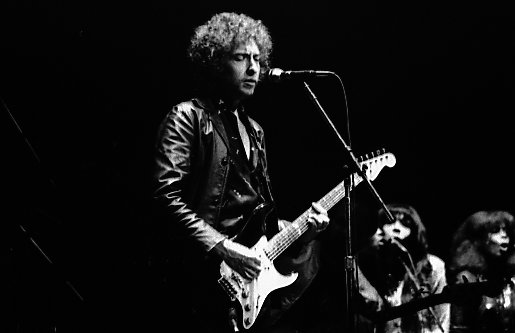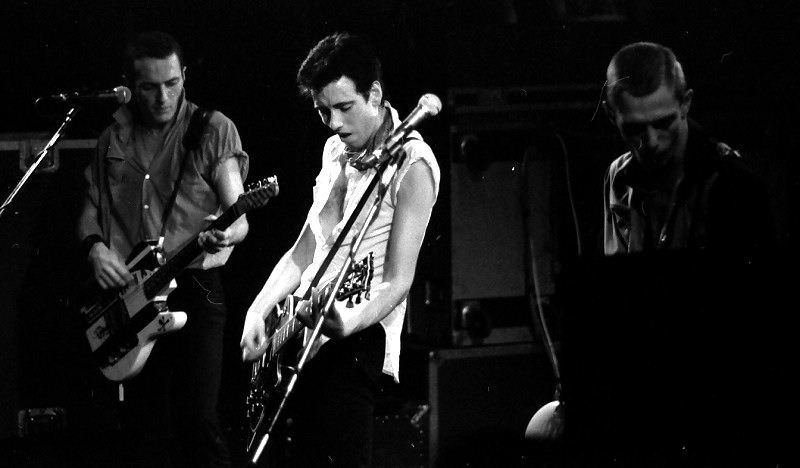by Mark Richardson
Inspired by Mr Gallop's list of gigs, I thought I would trawl back in time and see what emerged. Here are my top 5:
5. Bob Dylan, Blackbushe 1978. It turned out to be one of the biggest concerts I have ever been to, certainly far bigger than the next four on this list. Dylan was headlining a very disparate bunch of acts (as is usually the case at festivals). It has turned to be the only time I have seen him, and it was a very long set at the end of a very long day. He had been preceded by Eric Clapton, who was deeply uninspired and uninspiring, while Joan Armatrading hardly stirred an audience who had been exhausted by an amazing set by Graham Parker and the Rumour, a group I had been avidly following for a couple of years by then, my then-girlfriend being a school friend of one of the band. She had dragged me to a few concerts of theirs and I was quickly hooked by their pub-rock punk-rock vibe. They owned the stage, and everything after was slightly disappointing.
Until Dylan came on. The everything changed. It was very much like a different event: here was an icon, with an outrageously talented and experienced band, and led by an artist who ceaselessly changed arrangements of his own songs, often onstage (tricky if you are backing him). The songs were a mixture of old and new, but even then it seemed as if we were at some turning-point. His music and the audience that had turned out for him were both different from the audience for the other acts, and when the band launched into 'Forever Young' at the end, you could hear an audience as it sang the chorus seeming to mourn the passing of the years, standing in the gathering darkness with an uncertain future but still able to hold on to a shared past that even by then seemed archaic, lost and mythical, even though it was really only a decade ago. Spine-chilling.
Until Dylan came on. The everything changed. It was very much like a different event: here was an icon, with an outrageously talented and experienced band, and led by an artist who ceaselessly changed arrangements of his own songs, often onstage (tricky if you are backing him). The songs were a mixture of old and new, but even then it seemed as if we were at some turning-point. His music and the audience that had turned out for him were both different from the audience for the other acts, and when the band launched into 'Forever Young' at the end, you could hear an audience as it sang the chorus seeming to mourn the passing of the years, standing in the gathering darkness with an uncertain future but still able to hold on to a shared past that even by then seemed archaic, lost and mythical, even though it was really only a decade ago. Spine-chilling.
4. Elvis Costello, Leicester De Montfort 1979. Early days for Costello, perhaps. The Stiffs tour of 1977 had introduced him and a slew of other bands all keen to tap into the New Wave phenomenon. The live record had a huge audience, and Elvis Costello and the Attractions first album was riding high. Their new single 'Watching the Detectives' was still fresh, and they were also performing much of their next album, 'This Year's Model'. But the punk vibe was also abroad: it was now officially agreed that the best ways of showing appreciation of a musical event was to "po-go" (ie jump up and down very vigorously), be violent towards anyone nearby and spit in all directions, especially towards the band. Preferably, all at the same time. So getting to the front when the main band came on, once an absolute necessity, was now becoming a very health-threatening part of music. But you could tell that the band weren't enjoying the new rules much either. Costello was very angry. He ripped into songs with increasing venom, energised but also angered by the audience. The band was tight, focused and purposeful, and a future might be beckoning but who knew what? It was all about authenticity and living in the moment. Coming out into the cold January night, deafened by the noise and exhilarated by the spectacle, Leicester seemed both boring and also weirdly comforting.
3. John Martyn, Birmingham 1975. The thing is here that I am convinced this was a gig played at Aston University, but the internet promises me that he played at the Town Hall. Which is fine, but I remember it not being there. Because of what happened at the end, really. John Martyn is someone I have already talked about for Portsmouth Point, and in 1975 he turned up in Birmingham not long after I had started my degree there. I don't think he was following me. He had drummer John Stevens and bassist Danny Thompson, and things weren't going well for any of them, as Martyn explained to us a couple of songs in. Danny's "old lady" (old being 30-ish I suspect) had kicked him out, the drummer was also angry with everything (as drummers seem to be permanently) and a close friend of all of them, lead guitarist with the band Free (Paul Kossof), who was recovering from heroin addiction and had joined the tour at the invitation of Martyn, had had a sudden relapse, from which he subsequently never managed to recover and who died the following year.
Three angry men, jazzy folky soul-inflected musicians with immense talent, then tore into a series of lengthy numbers, starting with 'I'd Rather be the Devil', which certainly was memorably apt. They were magnificent: wounded, passionate, engaged and hugely talented, creating music that just seemed perfect, improvised and unique but also somehow permanent. The moment at the end: that was the odd part. People left, but for some reason Martyn stayed on stage, sitting there, puffing away at the perennial joint. My friend Eamonn and I were at the front, and Martyn just chatted to those of us. This never happened usually: certainly never at the Town Hall. Perhaps it did. All I know is that Eamonn was delighted that his claim to fame was that he shared a joint with John Martyn, while my more modest and shy claim was that I refused the offer of a joint from the one and only John Martyn.
Three angry men, jazzy folky soul-inflected musicians with immense talent, then tore into a series of lengthy numbers, starting with 'I'd Rather be the Devil', which certainly was memorably apt. They were magnificent: wounded, passionate, engaged and hugely talented, creating music that just seemed perfect, improvised and unique but also somehow permanent. The moment at the end: that was the odd part. People left, but for some reason Martyn stayed on stage, sitting there, puffing away at the perennial joint. My friend Eamonn and I were at the front, and Martyn just chatted to those of us. This never happened usually: certainly never at the Town Hall. Perhaps it did. All I know is that Eamonn was delighted that his claim to fame was that he shared a joint with John Martyn, while my more modest and shy claim was that I refused the offer of a joint from the one and only John Martyn.
2. The Clash, Barbarella's, Birmingham 1976. That was insane. To be fair, I had no idea the Clash were playing to begin with. I had heard them on John Peel's radio programme, and I had read about them in the NME, but I had just turned up to this gig in the local night club. Barbarella's had a stage of sorts (well, a space in a corner, really) and its name suggested it was going for the decadent feel of the SF film of the 1960s and starring a young Jane Fonda. It missed by a country mile the glamour and the decadence, but it was certainly grungy and dark, which suited groups like the Clash. They were just starting: no songs longer than 2 minutes, no standing still, no chord changes, guitar solos that were just screaming notes, lots and lots of sneering and posturing, but WOW what energy!! To be honest, it wasn't about musicality or about lyrics or about talent. They were all there, actually, but not that anyone could tell at the time. It was the event, like a 70's version of a 'happening' in the 1960s.
 |
| By Tony Morelli - Genesis 11/20/74, CC BY-SA 2.0 |
It was a band full of desire and talent and Charterhouse/boarding school inwardness, but also had a drummer who by the early 80s would be a single and LP chart topper, one Phil Collins, not a Charterhouse boy at all, but an outsider who would in 1975 inherit the band as lead singer Peter Gabriel departed, the LP 'Lamb...' becoming the ending of a Genesis. I would say Revelation (being the biblical opposite of Genesis) were it not for the fact that they already used that idea for an album title. Clever. Back at the gig, we must have all been teenagers there: I doubt any 30-somethings would have even known about it (other than the band), and precious few 20-somethings either. Probably mostly male, probably most of them with long hair, almost certainly wearing blue greatcoats like captured prisoners of war in some ancient film. I had a battered tape cassette machine under my coat in order to record the gig (must look for it later: probably worth a small fortune, a very small fortune, OK not much at all, fair enough, nothing), and I could see the recording level go off the scale as they hurtled into their first number 'Watcher of the Skies'. Why is it the top of the list? Perhaps, a little like No.2, the gig was in part an event. But the music was enthralling, all-encompassing. The power, the vision, the extroardinary spectacle of Gabriel's costumes, mixed with the mothballs of old coats, the patchouli oil favoured by the girls, and the unwashed afghan coats, all created a heady and special moment. I have a fondness of course for all of the gigs, and to be honest I don't think any of them were ever as great on stage as their records of the time, but Genesis came closest to a 3D sensurround cultural experience, and even though I would possibly loathe it now, I loved, loved, loved it then.




Comments
Post a Comment